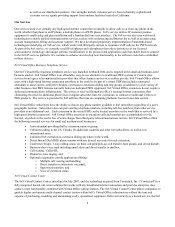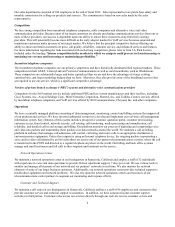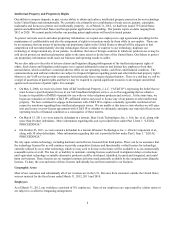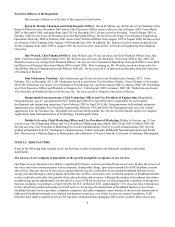8x8 2012 Annual Report Download - page 14
Download and view the complete annual report
Please find page 14 of the 2012 8x8 annual report below. You can navigate through the pages in the report by either clicking on the pages listed below, or by using the keyword search tool below to find specific information within the annual report.12
carriers if such pricing differentials diminish or disappear, however, and we will be unable to use such pricing differentials to
attract new customers in the future. Continued rate decreases would require us to lower our rates to remain competitive and
would reduce or possibly eliminate any gross profit from our services. In addition, we may lose subscribers for our services.
Reform of federal and state Universal Service Fund programs could increase the cost of our service to our customers
diminishing or eliminating our pricing advantage.
The FCC and a number of states are considering reform or other modifications to Universal Service Fund programs. The way
we calculate our contribution may change if the FCC or certain states engage in reform or adopt other modifications. In April,
2012, the FCC released a Further Notice of Proposed Rulemaking to consider reforms to the manner in which companies, like
us, contribute to the federal Universal Service Fund program. In general, the Further Notice of Proposed Rulemaking is
considering questions like: what companies should contribute, how contributions should be assessed, and methods to improve
the administration of the system. We cannot predict the outcome of this proceeding nor its impact on our business at this time.
Should the FCC or certain states adopt new contribution mechanisms or otherwise modify contribution obligations that
increase our contribution burden, we will either need to raise the amount we currently collect from our customers to cover this
obligation or absorb the costs, which would reduce our profit margins. Furthermore, the FCC has ruled that states can require
us to contribute to state Universal Service Fund programs. A number of states already require us to contribute, while others are
actively considering extending their programs to include the services we provide. We currently pass-through Universal Service
Fund contributions to our customers which may result in our services becoming less competitive as compared to those provided
by others.
We may become subject to state regulation for certain service offerings.
Certain states take the position that offerings by VoIP companies, like us, are intrastate and therefore subject to state regulation.
These states argue that if the beginning and end points of communications are known, and if some of these communications
occur entirely within the boundaries of a state, the state can regulate that offering. We believe that the FCC has pre-empted
states from regulating VoIP offerings like ours in the same manner as providers of traditional telecommunications services. We
cannot predict how this issue will be resolved or its impact on our business at this time.
We rely on third party network service providers to originate and terminate substantially all of our public switched
telephone network calls.
We leverage the infrastructure of third party network service providers to provide telephone numbers, PSTN call termination
and origination services, and local number portability for our customers rather than deploying our own network throughout the
United States. This decision has resulted in lower capital and operating costs for our business in the short term but has reduced
our operating flexibility and ability to make timely service changes. If any of these network service providers cease operations
or otherwise terminate the services that we depend on, the delay in switching our technology to another network service
provider, if available, and qualifying this new service could have a material adverse effect on our business, financial condition
or operating results.
While we believe that relations with our current service providers are good, and we have contracts in place, there can be no
assurance that these service providers will be able or willing to supply cost-effective services to us in the future or that we will
be successful in signing up alternative or additional providers. Although we could replace our current providers, if necessary,
our ability to provide service to our subscribers could be impacted during this timeframe, and this could have an adverse effect
on our business, financial condition or results of operations. The loss of access to, or requirement to change, the telephone
numbers we provide to our customers also could have a material adverse effect on our business, financial condition or
operating results.
Due to our reliance on these service providers, when problems occur in a network, it may be difficult to identify the source of
the problem. The occurrence of hardware and software errors, whether caused by our 8x8 service or another vendor’ s
products, may result in the delay or loss of market acceptance of our products and any necessary revisions may force us to
incur significant expenses. The occurrence of some of these types of problems may seriously harm our business, financial
condition or operating results.
























